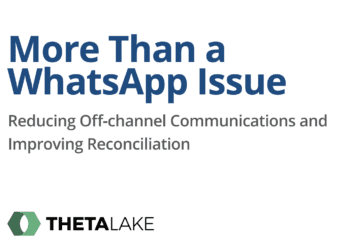An overstressed data-gathering process can generate information silos, and the process of proving data-backed valuations can be laborious. Greater data transparency is needed to ultimately facilitate, rather than impede, compliance efforts.
While investment firms seem to be doing well handling compliance during the pandemic, some wonder if strong financial markets are actually covering up shortfalls. According to a survey by Smarsh of compliance pros in financial industries, 83 percent said their firms allow conferencing tools, yet only 22 percent have established retention and oversight programs for the content that these platforms can hold.
Firms already struggle to gather timely, updated data to manage portfolios and make decisions; the same holds true for compliance. With remote work adding challenges to retention and oversight, and compliance often challenged to stay in the loop, an already dangerous gap will continue to widen as new communication tools proliferate.
It’s a scenario that’s causing some restless nights for chief compliance officers.
Just a Dream?
CCOs want consistency, control and efficiency. However, these dreams can quickly take a dark turn when it comes to offices that allocate to external investment managers. Updates arrive in various formats and at different times, making it tough to gather and make data usable for compliance. This is especially true when data must be entered into multiple systems due to software that’s built for narrow purposes.
This can make it difficult for a firm to meet an assortment of reporting deadlines. On top of this, the CCO must ensure their companies adhere to a lengthy list of compliance regulations. Not measuring up could result in serious fines and, perhaps even worse, a damaged reputation that could chase customers and prospects away.
To meet regulatory measures, CCOs must task employees to get the job done by any means possible, which isn’t sustainable because a lot of time is required for data entry, reviews and revisions. A CCO might try to find an answer in tweaking workflows, deadlines and responsibilities. But progress can be incremental and may not scale. So, they’ll look to technology solutions, none of which fully accomplishes all that needs to get done.
The only way to gain any semblance of control is with extraordinary manual effort across the company. Even then, the resulting data can be difficult to prove. This is why investment teams are often skeptical about reports and analyses regarding portfolios. It’s the same reason CCOs fear being challenged on compliance issues. Matters are made worse when outdated retention and oversight programs fail to capture, archive and supervise remote communications, which is particularly likely with newer conferencing platforms.
What’s Real?
It’s possible for employees to repeatedly review numbers for accuracy and ensure changes have been logged correctly. At that point, a firm can rightfully feel they’d be able to answer compliance questions. However, if the SEC asks for proof that those numbers are correct, it can be quite stressful to validate and support those figures.
An overstressed data-gathering process will cause a default to spreadsheets and information silos that trap data, making it difficult to prove conclusions. Again, this happens because external investment managers provide data on portfolios to internal teams in different ways and it’s used for different purposes – which creates different versions of reality.
One of the major issues is getting a handle on what data external managers will provide and bringing it into reporting – but there are many variables that could impede accuracy. A firm may have client assets with 100 external investment managers. They could be invested in exchange-traded, mutual, hedge and private-equity funds.
Then there are the various deadlines for such things as accounting and performance reporting. Accounting books and records may need to be closed by mid-month, a performance estimate might have to be done a week prior for the investment committee and a portfolio manager may need an analysis done using best available data at an even earlier date.
With data coming in at all times, a valuation could be different every single day, as would the conclusions. Providing the best available information at a specific time is really all you hope to do, which ends up generating various versions of the results. Even in controlled environments, audit trails can be overwhelming and can make reconciling results a laborious chore for everyone.
Double Jeopardy
Compliance reporting, while standardized, is never how an investment office views their portfolios. Even if you provide a template that reflects how you’d like to receive data, external managers might send you the information in the way they want. Or, they might be incapable of providing the granularity you’re after. And there may not be much you can do about it.
For instance, from an investment perspective, a client might have questions about the Philippines, but all an external investment manager can provide is details on Asia. With data stuck in various systems and spreadsheets, it would be too labor intensive to get numbers and determine geographic exposure. The same applies to details on such things as environmental, social and corporate governance (ESG). The last thing a college endowment wants is to find they’re invested in fossil fuels when the institution is highly regarded for clean energy studies.
A lack of data transparency can not only jeopardize investment efforts, it can jeopardize compliance.
That’s Logical
This longtime problem is now being solved by next-generation software that ingests data in manageable ways. Specifically, it gives CCOs the ability to process and analyze preliminary and estimated information alongside final accounting data. In doing this, labor over data quality and consistency is eliminated, simplifying compliance. Game-changing data accuracy, transparency and timeliness can also enable better decision-making.
Key to this approach is data engine technology that records data once, then sends it to the right system for portfolio accounting, performance analysis, reporting and investment tracking. Indexing can then provide insight into data quality and an audit trail, with algorithms analyzing indicators and giving data a confidence rating.
In adding this layer of logic, firms can:
- Improve data collection, achieving greater control over gathering data while eliminating excessive human intervention and the likelihood of manual entry errors.
- Build custom processes, allowing firms to leverage specific criteria to build processes that anticipate and can help resolve issues.
- Organize data flow. With all data captured as a single source, firms can organize the flow to highlight intended purposes such as investment committee reporting, ad hoc analytics and compliance.
Less Stress, More Compliance
Let’s go back to the SEC and what would happen if they asked for proof of a particular number. Instead of sending staff into a panicked search of spreadsheets and emails, in an ideal world, a CCO can immediately show what occurred with a few keystrokes, as well as when and why changes were made, all supported by explanatory footnotes.
In seconds, a CCO could resolve what previously would have taken an entire staff hours, making compliance less stressful and much faster. Further, with the correct software, not only are data transparency and compliance easier, but tremendous time and cost savings will follow.
Finally, CCOs should be able to rely on their data to solve compliance problems, not create them.



 Ted Meissner is CEO of
Ted Meissner is CEO of 





